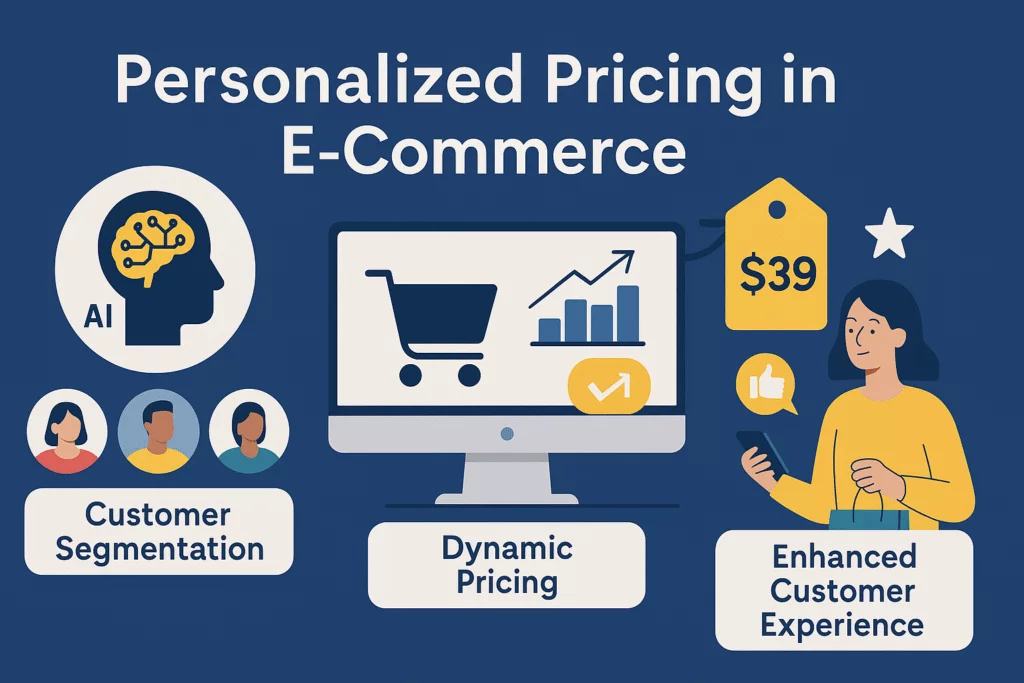In the dynamic world of e-commerce, pricing strategies play a pivotal role in influencing consumer behavior and maximizing revenue. One such strategy gaining prominence is personalized pricing, where businesses tailor prices based on individual customer data. This approach, powered by Artificial Intelligence (AI), enables companies to offer prices that reflect a customer’s purchasing behavior, preferences, and perceived value.

Understanding Personalized Pricing
Personalized pricing involves setting different prices for the same product or service based on individual customer characteristics. Factors influencing personalized pricing include:(Informa TechTarget)
- Purchase History: Analyzing past transactions to predict future buying behavior.
- Browsing Behavior: Monitoring pages visited, time spent, and products viewed.
- Demographics: Considering age, location, and other personal attributes.
- Device and Time: Adjusting prices based on the device used or time of access.
By leveraging these data points, businesses can offer prices that align with a customer’s willingness to pay, enhancing the shopping experience and increasing conversion rates.
Benefits of Personalized Pricing
- Increased Revenue: Tailoring prices can lead to higher sales volumes and profit margins by capturing consumer surplus.
- Enhanced Customer Experience: Providing prices that reflect individual preferences fosters customer satisfaction and loyalty.
- Competitive Advantage: Differentiating pricing strategies can set a business apart in a crowded market.
- Efficient Inventory Management: Dynamic pricing helps in balancing demand and supply, reducing overstock or stockouts.
Challenges and Ethical Considerations
While personalized pricing offers numerous advantages, it also presents challenges:
- Privacy Concerns: Collecting and analyzing personal data raises questions about consumer privacy and data protection.
- Perceived Fairness: Customers may feel disadvantaged if they discover price discrepancies, potentially harming brand reputation.
- Regulatory Compliance: Businesses must navigate laws and regulations related to pricing discrimination and data usage.
To mitigate these issues, transparency in pricing strategies and adherence to data protection regulations are essential.
Implementing Personalized Pricing with AI
Artificial Intelligence plays a crucial role in executing personalized pricing strategies effectively:
- Data Analysis: AI algorithms process vast amounts of customer data to identify patterns and predict behavior.
- Dynamic Adjustments: Prices can be adjusted in real-time based on market demand, inventory levels, and customer interactions.
- Segmentation: AI helps in segmenting customers into groups for targeted pricing strategies.(Wikipedia)
By integrating AI, businesses can automate pricing decisions, ensuring responsiveness to market changes and customer needs.
Expertrec: Enhancing Personalized Pricing Strategies
Expertrec offers AI-powered solutions that can significantly enhance personalized pricing strategies:
- Advanced Search Capabilities: Delivering personalized search results that align with individual preferences.
- Behavioral Analytics: Understanding customer behavior to inform pricing decisions.
- Real-Time Data Processing: Enabling dynamic pricing adjustments based on current data.
Implementing Expertrec’s solutions can lead to improved customer satisfaction, increased sales, and a stronger competitive position in the market.
Ready to revolutionize your pricing strategy? Explore Expertrec’s AI-powered solutions and discover how personalized pricing can elevate your e-commerce business.
Conclusion
Personalized pricing, empowered by AI, offers a strategic advantage in the e-commerce landscape. By understanding and responding to individual customer needs, businesses can enhance the shopping experience, increase loyalty, and drive revenue growth. However, it’s essential to balance personalization with ethical considerations and transparency.
FAQs
Q1: How does personalized pricing differ from dynamic pricing?
Personalized pricing tailors prices based on individual customer data, while dynamic pricing adjusts prices based on market demand and other external factors.
Q2: Is personalized pricing legal?
Yes, but businesses must ensure compliance with data protection laws and avoid discriminatory practices. Transparency with customers is also crucial.
Q3: Can small businesses implement personalized pricing?
Absolutely. With AI tools becoming more accessible, small businesses can adopt personalized pricing strategies to enhance competitiveness.
Q4: How do customers react to personalized pricing?
Reactions vary. While some appreciate tailored offers, others may perceive it as unfair. Clear communication and value demonstration are key to positive reception.




